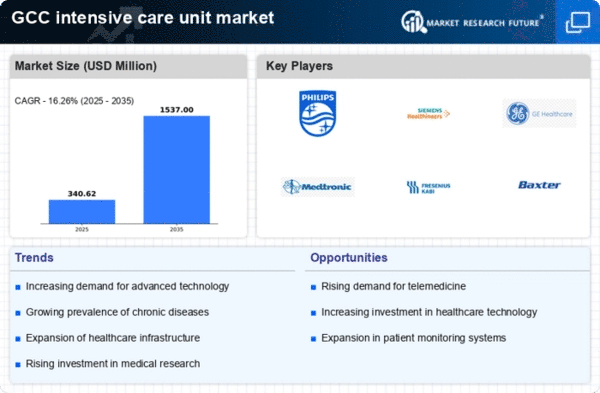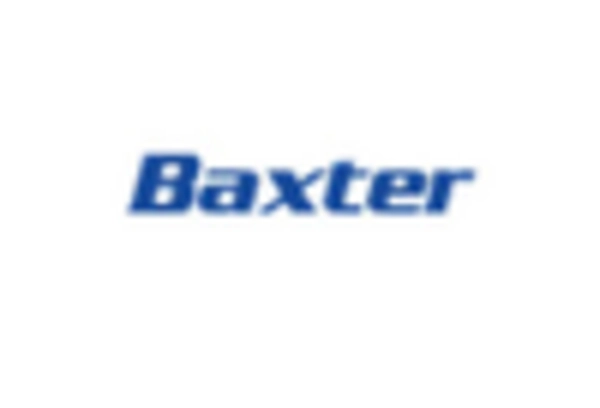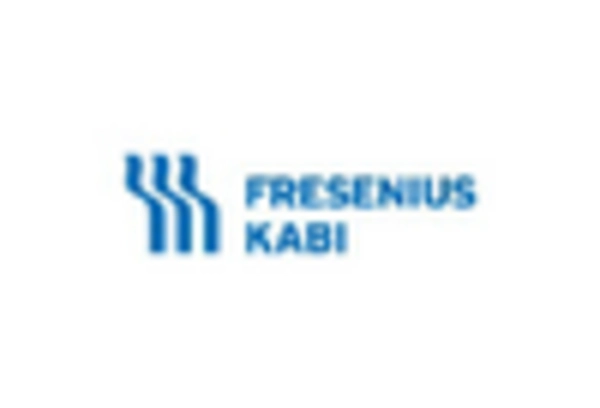Focus on Patient-Centric Care Models
There is a growing emphasis on patient-centric care models within the intensive care-unit market. Healthcare providers are increasingly recognizing the importance of tailoring care to individual patient needs, which enhances recovery outcomes. This shift is supported by evidence suggesting that patient engagement and satisfaction can lead to improved health results. In the GCC, hospitals are adopting strategies that prioritize patient comfort and involvement in care decisions. This trend is likely to drive the development of more specialized intensive care units that cater to specific patient populations, thereby expanding the market and improving overall healthcare delivery.
Rising Prevalence of Chronic Diseases
The increasing prevalence of chronic diseases in the GCC region is a primary driver for the intensive care-unit market. Conditions such as diabetes, cardiovascular diseases, and respiratory disorders are becoming more common, necessitating advanced medical care. According to recent health statistics, chronic diseases account for approximately 70% of total deaths in the region. This trend is likely to escalate the demand for intensive care services, as patients with chronic conditions often require prolonged hospitalization and specialized monitoring. The intensive care-unit market is thus positioned to expand significantly, as healthcare providers invest in advanced technologies and skilled personnel to cater to this growing patient population.
Investment in Healthcare Infrastructure
The GCC countries are witnessing substantial investments in healthcare infrastructure, which is a crucial driver for the intensive care-unit market. Governments are allocating significant budgets to enhance healthcare facilities, aiming to improve patient outcomes and reduce mortality rates. For instance, the healthcare expenditure in the GCC is projected to reach $100 billion by 2025, with a considerable portion directed towards upgrading intensive care units. This investment is expected to facilitate the adoption of state-of-the-art medical equipment and technologies, thereby enhancing the capabilities of intensive care units to manage complex cases effectively.
Technological Integration in Healthcare
The integration of advanced technologies in healthcare is transforming the intensive care-unit market. Innovations such as telemedicine, artificial intelligence, and remote monitoring systems are enhancing patient care and operational efficiency. For example, the use of AI in patient monitoring can lead to early detection of complications, potentially reducing ICU admissions. The GCC region is increasingly adopting these technologies, with investments in health tech projected to exceed $2 billion by 2025. This technological evolution is likely to improve the quality of care in intensive care units, making them more efficient and responsive to patient needs.
Aging Population and Increased Life Expectancy
The aging population in the GCC is contributing to the growth of the intensive care-unit market. As life expectancy rises, the incidence of age-related health issues, such as organ failure and severe infections, is likely to increase. The demographic shift indicates that by 2030, individuals aged 60 and above will constitute a significant portion of the population. This demographic trend suggests a heightened demand for intensive care services, as older adults often require more intensive medical interventions. Consequently, healthcare systems are expected to adapt by expanding their intensive care capabilities to meet the needs of this vulnerable population.
















